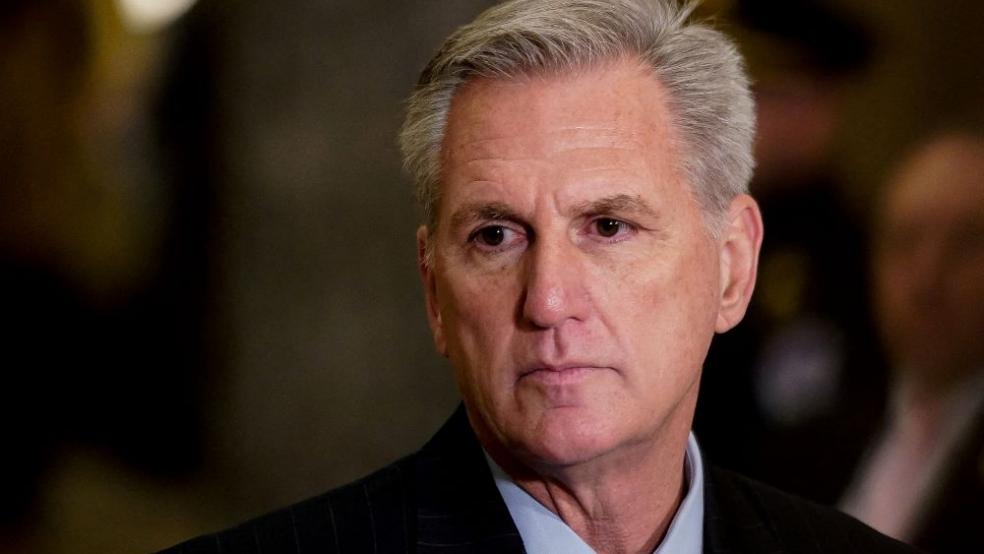The debt limit battle is heating up.
House Speaker Kevin McCarthy (R-CA) on Wednesday announced a bill that he said would raise the debt limit into next year and cut some $4.5 trillion in spending. The bill has no chance of passing the Senate, but Republicans hope that it can draw President Joe Biden to the negotiating table. For now, though, the two sides are trading barbs more than offers. With a deadline looming potentially as soon as June, the two sides have thus far made no progress toward avoiding a debt default that could have devastating economic consequences.
The new Republican plan would raise the debt limit by $1.5 trillion or until the end of March 2024, whichever comes first. That timeframe would potentially set up another debt fight in the run-up to the presidential election.
In a speech on the House floor, McCarthy said that the legislation would return discretionary spending to 2022 levels and limit growth to 1% a year. It would also claw back unspent Covid-19 funding, prohibit Biden’s student loan forgiveness plan, reverse the green energy tax breaks enacted last year as part of Democrats’ Inflation Reduction Act and rescind some $70 billion in additional IRS funding from that law. The GOP package would also add work requirements for Medicaid and food stamps and include Republicans’ energy bill, H.R. 1, as well as a regulatory reform plan.
The 320-page bill is titled the “Limit, Save, Grow Act of 2023,” using the three buzzwords McCarthy has chosen to describe the Republican fiscal agenda — limit federal spending, save taxpayer money and grow the economy.
That title doesn’t exactly roll off the tongue and certainly won’t win any marketing awards, but Republicans hope it does something more important: demonstrate that they are unified as they try to exert some leverage to force Biden to make concessions on spending in exchange for a debt limit increase.
“President Biden and Senator Schumer have no right to play politics with the debt calling,” McCarthy said Wednesday. “Their extreme positions risk provoking the very crisis they claim to want to avoid, they need to sit down, negotiate and address this crisis. Now that we’ve introduced a clear plan for a debt limit increase, they have no more excuse and refuse to negotiate.”
The president wants Congress to pass a debt limit increase with no strings attached and has indicated that there’s little point in negotiating before Republicans put forth their own proposal. On Wednesday, he sought to compare his agenda with the new GOP plan, which he labeled “the same old trickle-down dressed up in MAGA clothing.”
Biden gave his speech at a union hall in Accokeek, Maryland, pointedly contrasting the location with McCarthy’s speech Monday at the New York Stock Exchange.
“Massive cuts in programs you count on,” Biden said of the GOP plan, later adding, “That’s the MAGA economic agenda: spending cuts for working and middle class folks. It’s not about fiscal discipline, it’s about cutting benefits for folks that they don’t seem to care much about.”
McCarthy included a prebuttal of sorts in his own speech. “President Biden is skipping town to deliver a speech in Maryland rather than sitting down to address the debt ceiling,” he said. “In fact, he’s been avoiding the issue for 77 straight days and counting.”
What’s next: The Republican bill is expected to get a House floor vote next week before lawmakers leave for a week-long recess. McCarthy can only afford to lose four of his members, making this gambit the biggest test yet of his grip on his fractious conference. But Biden spoke to Schumer and House Minority Leader Hakeem Jeffries earlier this week and said again that there will be no negotiation on the debt limit. “President Biden, Leader Schumer, and Leader Jeffries agree that we won’t negotiate over default and Republicans should pass a clean bill like they did three times in the previous administration,” the White House said.
So McCarthy’s bill might not result in any progress.
The bottom line: “McCarthy holds a pretty bad hand here,” Punchbowl News suggested this morning. “The debt limit battlefield isn’t a good one for Republicans. Plus, he’s dealing with a conference that’s unusually interested in picking ideological fights they can’t win.”
But McCarthy and Republicans picked this fight. If they can’t pass their own bill next week, GOP lawmakers may have to scramble for a way out of it.





